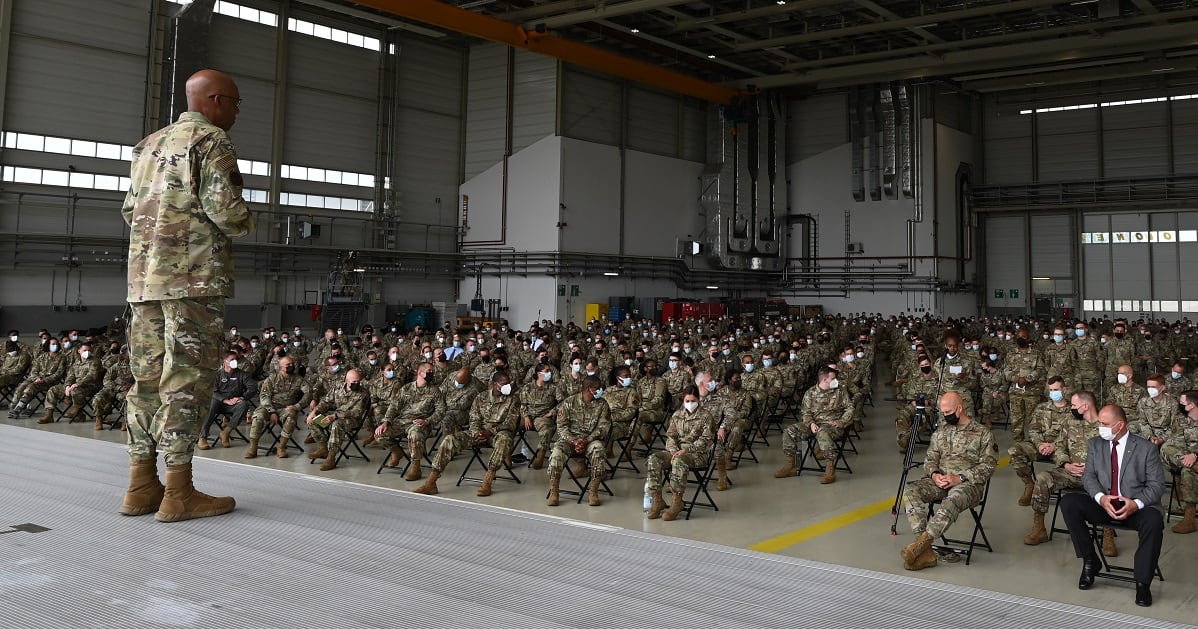While the recent commentary by Maj. Kevin Rossillon identifies some of the issues facing the Air Force, offering early promotions without overhauling the officer career development system will not be enough to drive meaningful change. Allowing high performing officers to promote early merely serves as a Band-Aid that fails to address the root cause of the officer retention problem.
RELATED

The widely read commentaries by Col. Jason Lamb, writing under the pseudonym of “Ned Stark,” showcase the flaws of a system where superior performers are highlighted early in their careers and fast-tracked for promotion. Not only does the current officer development system lack the tools to accurately identify which young officers are truly superior, but promoting officers early prevents them from fully developing their leadership skills at the tactical level.
I have chosen to leave active duty as a captain not because I doubted that I would get promoted, but because the Air Force did not give me an opportunity to pursue my passions. For myself and many of my peers, a more meaningful role — with the option to tailor my career to my personal strengths — would yield far more job satisfaction than an early promotion. Many officers will not find themselves on a command track, so it is crucial the Air Force consider their job satisfaction and long-term career outlook. Revising how officer careers are managed at an early stage would not only allow the Air Force to accurately identify superior performers, but would also enable officers who may not desire, or be qualified, to command to match their careers to their talents.
RELATED

Maj. Rossillon states that retention is driven by how individual officers assess their future and responsibilities, which he associates with rank and recognition. While rank is an obvious indicator, it is not and should not be the sole determinant of an officer’s value. Placing too much emphasis on rank creates a careerist paradigm that values authority over ethical leadership.
Furthermore, Maj. Rossillon’s discussion of why junior officers leave the Air Force shows that many non-rated officers have limited opportunities to influence the service. As the Air Force prepares itself for operations against strategic competitors, it cannot continue the traditional hierarchy of “pilots and everybody else.” Many other communities will be just as critical to airpower as the ability to drop bombs in future conflicts.
The Air Force needs to expand and diversify opportunities for its most talented non-rated officers to gain experience in operational environments. Officers in these career fields need roles where they can lead and take risks to successfully prepare them for combat scenarios. Presently, many of these officers know that their opportunities to promote and lead will be limited compared to their rated peers. This has encouraged them to pursue careers in the civilian sector and denied the service the breadth of talent it desperately needs.
Today, a rapidly advancing technological landscape makes the hands-on expertise of junior officers essential to strategic innovation. Capable young officers deserve opportunities to influence the service based on their knowledge and abilities, unhindered by the rank they wear. This will also allow the service to accurately evaluate which officers are truly ready to serve in a higher grade.
Currently, stratification against their peers is the primary way officers are identified for promotion and leadership. Simply reintroducing early promotions without revamping how officer records are evaluated will only detract from young officers’ focus on developing tactical proficiency. Even today, stratification is initiated extremely early in an officer’s career. This offers an inherently skewed perception of talent by rewarding those who luck into early opportunities to highlight themselves. Further, it inspires a system where commanders may feel obligated to assign these individuals to prestigious positions above the unit level. This robs high performing officers of the opportunity to grow in a squadron and creates a culture where officers are pressured to race toward promotions rather than becoming expert tacticians and leaders.
Additionally, some officers on this “fast track” can simply coast off their stratifications without putting the same level of effort into job performance as their peers. Once stratification is earned, those officers are off to an early head start and propelled on a path where they miss out on fundamental development opportunities. Early stratification not only punishes those who are not showcased early on in their careers, making it nearly impossible for them to catch up, but it also encourages superior performers to avoid risk in order to maintain their status.
The Ned Stark op-eds warn against a promotion system incapable of correcting for mistakes due to premature determinations of talent. Rather than deal with the consequences of promoting the wrong officers, the Air Force should revise its talent management process to develop a more accurate assessment of which individuals are ready to advance.
To support access to additional opportunities and avoid promoting the wrong leaders, a more wholistic evaluation system is needed. While current officer performance reports, and the embedded stratifications, capture job performance metrics, they fail to communicate a 360-degree perspective of an individual. Peer and subordinate feedback are important tools the current system lacks. In many instances, an individual may outperform their peers on paper, but missing from that snapshot is a detailed assessment of their character and ability to collaborate, communicate and innovate.
Today, the Air Force uses rank, and to some extent career field, to develop general inferences about an officer’s emotional intelligence and strategic thinking. A revised talent management system that captures these traits effectively would allow the service to reliably identify which officers are truly stand-out performers and not just the beneficiaries of early recognition.
In my own career, I have frequently witnessed officers fail when they were placed in positions of leadership before they were ready. Officers do not become good decision makers or learn to manage risk by virtue of the rank they wear. These skills are developed over time. Forcing officers to compete for early promotions would stifle innovation and create small cohorts of like-minded individuals who lack diversity and creative thinking.
Maj. Rossillon’s argument suggests that on-time promotions encourage a risk-averse climate. I would argue that early promotions give officers something tangible to lose and only perpetuate an unwillingness to take risks. He also argues, correctly, that current generations place a high value on a workplace that rewards excellence. If the service truly wanted to recognize its most talented performers, it could consider offering financial compensation to officers who outperform their base pay.
The Air Force already offers financial incentives like flight pay and aviation bonuses for skills it considers critical. Expanding this to reward strategic thinkers is a natural evolution that fits the needs of this generation of service members. Currently, within a unit, officers of equal rank will earn equal pay regardless of their individual work ethic and level of responsibility. This performance inequity yields frustration and sends an uninspiring message to other officers. Recognition beyond rank is a necessary component of job satisfaction for many talented officers.
Officer retention will not be improved without changing how the Air Force currently evaluates talent. While promoting talented officers early may seem like an appealing solution, it fails to address the core of the Air Force’s talent management challenges. Officers are stifled by a system that does not capture their unique talents. Early promotions will not reward excellence, they will limit the talent pool and present opportunities to misidentify potential.
The Air Force needs to reliably identify superior performers and reward them without sacrificing their opportunities to grow. Properly evaluating officers, and empowering them to lead based on their capability, addresses not only the desires of the workforce but will improve the overall health of the service. Rank alone is an insufficient metric of job satisfaction. Long-term career happiness could be achieved for many more officers if the Air Force could accurately identify and cultivate its future leaders and reward capable officers with meaningful opportunities to influence the service.
Capt. Brianna V. Dow is an Air Force officer who is separating from active duty later this year and transitioning to civilian management. She is an instructor pilot, electronic combat officer and executive officer at Air Force Special Operations Command and holds a master’s degree in public policy-international affairs.
Have an opinion?
This article is an Op-Ed and as such, the opinions expressed are those of the author alone. If you would like to respond, or have an editorial of your own you would like to submit, please email us.
Want more perspectives like this sent straight to you? Subscribe to get our Commentary & Opinion newsletter once a week.





